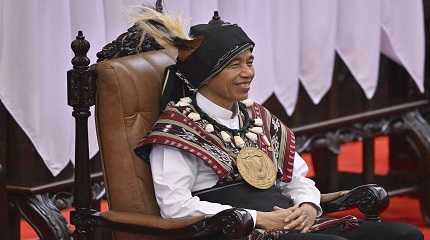
JAKARTA, Indonesia (AP) — Indonesia’s president on Wednesday urged a continuation of his educational reforms to turn Southeast Asia’s largest economy into one of the world’s biggest by its hundredth anniversary in 2045.
President Joko Widodo said in his annual state of the nation speech a day before Indonesia celebrates its 78th year of independence that it has a great chance of joining the globe’s top five economies with a per capital income of $25,000. Indonesia’s per capita income was $4,580 in 2022, according to the World Bank.
Indonesia proclaimed its independence from Dutch colonial rule on Aug. 17, 1945. To achieve its goal of “2045 Golden Indonesia” will require a major reform of its education and vocational institutions, Widodo said.
National elections are set for Feb. 14 and political speculation and gossip have been swirling ahead of the campaign, which begins in November. Campaigns are often marred by political smearing but are mostly peaceful.
“We are now entering a political year, the situation has mildly escalated,” Widodo said, “To that end, I have reiterated that future leadership should set a path forward for Indonesia’s future.”
Widodo, popularly known by his nickname Jokowi, began his second and final five-year term in October 2019 and is not eligible to run again.
The presidential election is expected to be a three-way race pitting the nominee of the governing Indonesian Democratic Party of Struggle, Ganjar Pranowo, against former general and Defense Minister Prabowo Subianto and former Jakarta Gov. Anies Baswedan.
Widodo said a continuation of his policy of increasing domestic processing of the country’s natural resource exports such as nickel, copper, bauxite, crude palm oil and seaweed could result in per capita income reaching $11,000 in the next few years and $25,000 by 2045.
After his administration halted exports of nickel ore in 2020, investment in nickel processing expanded rapidly and there now are 43 processing plants that provide a large number of jobs, he said.
“This is just for one commodity,” he said.
Nickel is a key component of rechargeable batteries.
Widodo’s administration also banned exports of bauxite, an aluminum ore, in June and plans to ban shipments of copper ore next May.
He said the challenges ahead will be daunting and policy choices will be increasingly challenging. “It takes courage and trust to make difficult, unpopular decisions,” he said.
Widodo is widely popular in the archipelago nation of more than 270 million people with an over 70% public trust rating, according to reputable pollster Kompas.
But he said being president is more challenging than many people think in a social media era in which every problem can reach the president, including anger, mockery, derision and slander. “Everything can be easily conveyed,” he said.
“It depends upon whether we wish to focus our energy to move forward or waste it on unproductive activities that may divide us or even cause us to step backward,” Widodo said.




